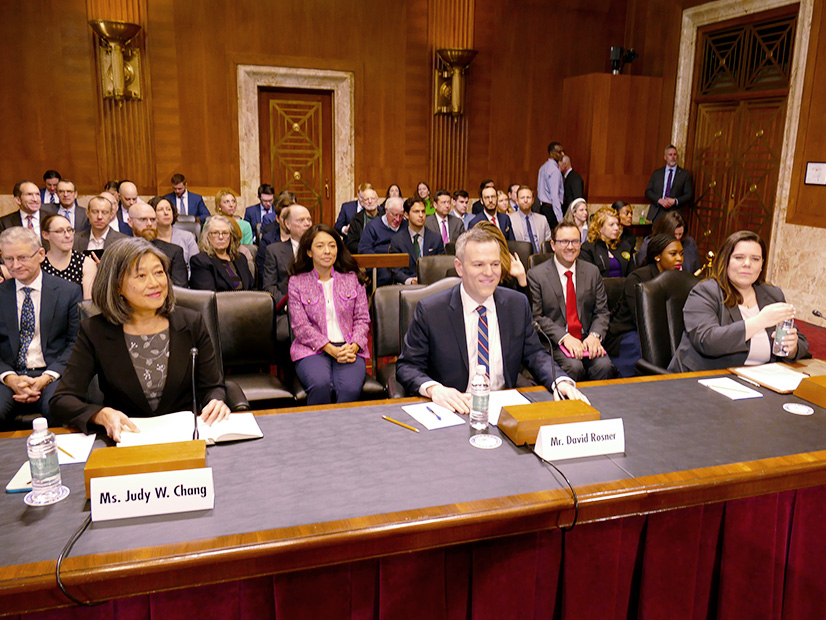
The three FERC commissioner nominees faced questions from the Senate Energy and Natural Resources Committee on March 21 in a hearing light on fireworks.
“The job calls for people who can fairly assess the needs and concerns of all interests affected by our energy policies and apply the law,” said committee Chair Joe Manchin (D-W.Va.). “Today we’re here to assess the experience and qualifications of three nominees before us for this important job.”
The nominees include Judy Chang, who is up for the seat opening in July, FERC staffer David Rosner, who most recently was detailed to Manchin’s committee and Lindsay See, the West Virginia solicitor general. Rosner and See are nominated for the two open seats on the commission. The committee took just three weeks to hold a nomination hearing after the White House announced choices. (See Biden Names 3 Nominees to Give FERC 5 Members Again.)
Ranking Member John Barrasso (R-Wyo.) tied Chang — who worked for Massachusetts after being hired by Gov. Charlie Baker (R) — to what he called that state’s “failed policies.”
“To remind the committee, this is a state that consumes twice as much electricity as it produces,” Barrasso said “It’s a state that benefits from the resolve of other states and other countries to produce the energy that Massachusetts needs and uses. And it’s a state where residents pay among the highest electricity and natural gas prices in the nation.”
In her role in Massachusetts, Chang advocated against expanding natural gas infrastructure to the region, which Barrasso highlighted in old quotes.
“As part of the state government, however, I personally experienced what it’s like to go through winters in New England and from the governor all the way down, the nail-biting experiences to make sure that we have not only reliable service, but affordable service,” Chang said. “And that is particularly the time when New England is more like Germany than it was like Pennsylvania in its cost and availability of natural gas.”
If she had a “magic wand” she said she would like to see more natural gas infrastructure for the region but noted that the issue is very difficult in New England.
Sen. Mazie Hirono (D-Hawaii) asked Chang how her time as Massachusetts’ undersecretary for Energy & Climate Solutions would inform her time on FERC. Chang responded that reliability must be considered, or the energy transition won’t work.
“No one in this country will tolerate any outages,” Chang said. “So, I think I understand the complexity of the energy systems through my work in Massachusetts, and I will definitely carry that with me going forward.”
Hirono also got into a back-and-forth with See over West Virginia v. EPA, a case the nominee argued on behalf of the state before the U.S. Supreme Court. The court relied on the “major questions” doctrine to find EPA overstepped the Clean Power Rule by using the Clean Air Act in a way Congress never intended. More recently, the court has taken up a case that threatens to overturn the Chevron Doctrine, which has courts pay deference to regulatory agencies on technical questions under their jurisdiction. (See: Supreme Court Hears Oral Arguments on Overturning Chevron.)
Hirono asked how See views FERC’s authority given the recent legal developments and points she made while arguing the case for West Virginia.
“I certainly understand that [FERC] will be a different role of acting impartially,” See said. “And I think that that will be important when it comes to [the] role of the agency. As I have said, my philosophy would be to follow the law. And I would be looking at experience to see what exactly it is Congress delegated and tasked FERC with doing. I’d be looking for that best interpretation consistent with governing statutes.”
Getting rid of Chevron would be a “tall order” for Congress because it would have to be very precise in what it delegates to agencies, said Hirono, who asked See whether FERC could consider carbon pollution in its decisions.
“My understanding is that FERC, like any other agency only has the authority that Congress has delegated to it,” See answered.



